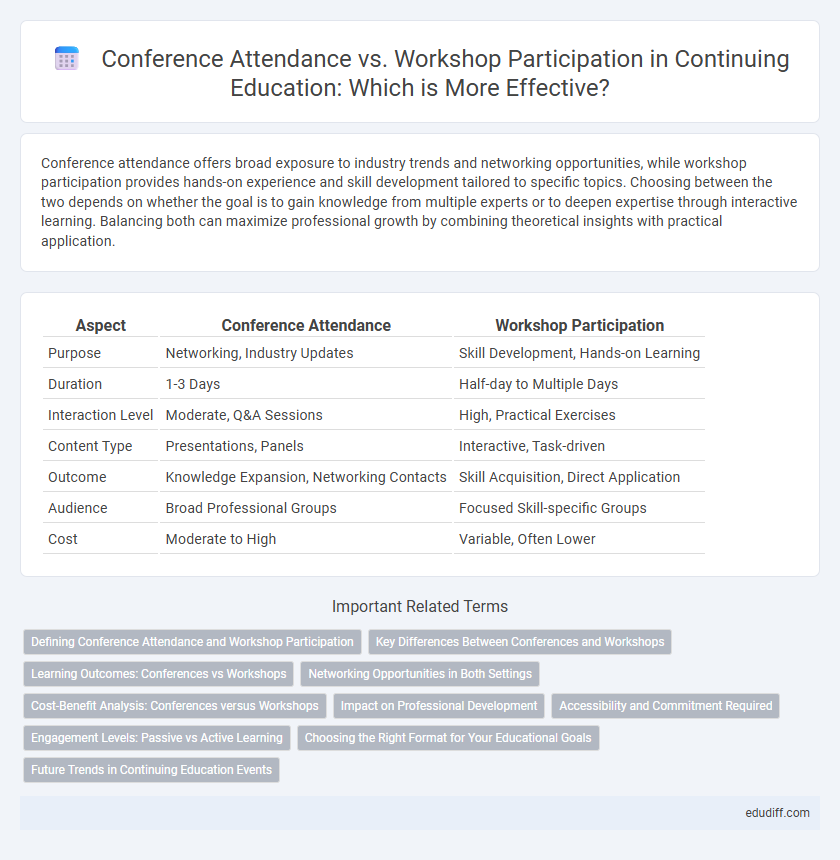Conference attendance offers broad exposure to industry trends and networking opportunities, while workshop participation provides hands-on experience and skill development tailored to specific topics. Choosing between the two depends on whether the goal is to gain knowledge from multiple experts or to deepen expertise through interactive learning. Balancing both can maximize professional growth by combining theoretical insights with practical application.
Table of Comparison
| Aspect | Conference Attendance | Workshop Participation |
|---|---|---|
| Purpose | Networking, Industry Updates | Skill Development, Hands-on Learning |
| Duration | 1-3 Days | Half-day to Multiple Days |
| Interaction Level | Moderate, Q&A Sessions | High, Practical Exercises |
| Content Type | Presentations, Panels | Interactive, Task-driven |
| Outcome | Knowledge Expansion, Networking Contacts | Skill Acquisition, Direct Application |
| Audience | Broad Professional Groups | Focused Skill-specific Groups |
| Cost | Moderate to High | Variable, Often Lower |
Defining Conference Attendance and Workshop Participation
Conference attendance involves actively being present at scheduled sessions, keynote speeches, and panel discussions during an organized event where industry professionals gather to share knowledge and network. Workshop participation refers to engaging in interactive, hands-on sessions designed to develop specific skills or deepen understanding of a particular topic within the conference framework. Both forms of involvement provide unique learning opportunities, with conferences offering broad insights and workshops enabling practical application.
Key Differences Between Conferences and Workshops
Conferences typically gather a large audience for broad-topic presentations, networking, and keynote speeches, whereas workshops focus on smaller groups with interactive, hands-on activities aimed at skill development. Conference attendance offers exposure to diverse ideas and industry trends, while workshop participation emphasizes deep learning and practical application of specific techniques. The time commitment for workshops is often more intensive but shorter, fostering an immersive educational experience compared to the multi-day schedule of conferences.
Learning Outcomes: Conferences vs Workshops
Conference attendance offers broad exposure to industry trends and networking opportunities, enhancing general knowledge and professional connections. Workshop participation provides hands-on experience with practical skills, fostering deeper understanding and immediate application of specific techniques. Learning outcomes from workshops typically demonstrate higher retention and skill proficiency compared to the more passive learning environment of conferences.
Networking Opportunities in Both Settings
Conference attendance offers extensive networking opportunities by bringing together a diverse range of professionals, speakers, and industry leaders in a centralized setting. Workshop participation facilitates deeper connections through interactive, small-group environments that encourage collaboration and hands-on learning. Both settings enhance professional relationships but differ in scale and intimacy, with conferences providing breadth and workshops fostering depth.
Cost-Benefit Analysis: Conferences versus Workshops
Evaluating the cost-benefit analysis of conference attendance versus workshop participation reveals that workshops offer targeted skill development at a lower financial outlay, providing practical training tailored to specific professional needs. Conference attendance, while generally more expensive due to registration fees, travel, and accommodation, delivers broader networking opportunities and exposure to industry trends that can enhance professional visibility and long-term career growth. Organizations and individuals should balance the immediate, focused learning outcomes of workshops against the expansive strategic benefits of conferences to optimize professional development investments.
Impact on Professional Development
Conference attendance broadens industry knowledge through exposure to expert presentations and networking opportunities, fostering a wider understanding of current trends. Workshop participation offers hands-on experience and skill development, directly enhancing practical capabilities and problem-solving techniques. Combining both approaches maximizes professional growth by integrating theoretical insights with applied learning.
Accessibility and Commitment Required
Workshops typically demand higher commitment levels due to hands-on activities and limited seating, which can restrict accessibility for some attendees. Conferences often provide broader accessibility options, including virtual attendance and larger venues, making it easier for diverse audiences to participate. The choice between conference attendance and workshop participation largely depends on an individual's available time and need for interactive learning experiences.
Engagement Levels: Passive vs Active Learning
Conference attendance typically involves passive learning, where participants primarily listen to presentations and absorb information without direct involvement. Workshop participation encourages active learning, requiring attendees to engage in hands-on activities, discussions, and problem-solving exercises. Higher engagement levels in workshops often lead to better skill retention and practical application compared to passive conference attendance.
Choosing the Right Format for Your Educational Goals
Selecting between conference attendance and workshop participation hinges on your educational goals; conferences offer broad exposure to current trends and networking opportunities while workshops provide hands-on, skill-specific training. Workshops typically deliver deeper engagement in targeted subjects, fostering practical expertise crucial for professional development. Prioritize workshops for skill mastery and conferences for expansive learning and industry connections to maximize educational outcomes.
Future Trends in Continuing Education Events
Conference attendance is evolving with virtual and hybrid formats increasing accessibility and global participation, leading to enriched networking opportunities and knowledge exchange. Workshop participation emphasizes interactive, hands-on learning experiences that cater to personalized skill development and immediate application of new techniques. Future trends suggest a blend of AI-driven personalized content delivery and immersive technologies like AR/VR to enhance engagement and retention in continuing education events.
Conference Attendance vs Workshop Participation Infographic

 edudiff.com
edudiff.com